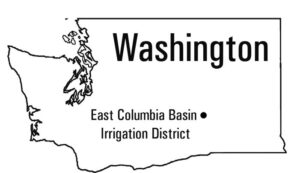Craig Simpson is the general manager of the East Columbia Basin Irrigation District (ECBID), which is part of the Columbia Basin Project. He has worked for ECBID for 25 years. ECBID has 160,000 acres and 88 employees. In this interview, Mr. Simpson tells Irrigation Leader about the precautions the district is taking to protect its employees during the COVID‑19 pandemic.
 Irrigation Leader: Please tell us about yourself and about the district.
Irrigation Leader: Please tell us about yourself and about the district.
Craig Simpson: I’ve been with ECBID since 1995 and took over as the manager in 2007. ECBID is the smallest of the three irrigation districts in the Columbia Basin Project. We currently serve about 160,000 irrigated acres and are authorized for 472,000 acres at full development. We are currently carrying out a project to develop about 90,000 additional acres of groundwater-replacement water supplies from the Columbia Basin Project. We have a staff of about 90 people, many of whom are currently associated with that development. We usually have about 75 standard employees.
Irrigation Leader: How has the COVID‑19 pandemic affected your operations?
Craig Simpson: It has caused significant change, but it hasn’t been crippling. Since we provide an essential service, we had to maintain most of our employees in their current statuses. The majority of an irrigation district’s employees work outside, which doesn’t allow for remote work. We were able to have five of our office employees work remotely, but our internet bandwidth capacity didn’t allow for anything more than that. In the office, we insist pretty vehemently on maintaining a minimum of 6 feet of distance between people at all times. We hold most of our meetings outside, with plenty of spacing. If we do have an indoor meeting, it’s in a room large enough to allow for appropriate distancing. We’ve also been disinfecting on a regular basis. We’ve shut down our offices to all outside entities. We’re doing everything for the startup of the season by phone, including payments, clearances, and water orders. The paperwork is dropped off in a dropbox. It’s gone better than we expected it would. Our landowners have embraced the change. Many of us are not necessarily pleased with the changes, but we understand the rationale. The startup went pretty well as a result of the coordination with our landowners.
Irrigation Leader: Is there anything else that you’re doing to keep your customers and employees safe?
Craig Simpson: We’re trying to follow the guidelines that we’ve put in place. Our Washington State Water Resources Association and National Water Resources Association roundtable discussions were helpful. There were things mentioned in those calls that I hadn’t thought of that we ended up instituting immediately. Beyond that, I don’t think we’re doing anything out of the ordinary. We’re just trying to keep people away from each other and minimize our exposure. We asked all our employees to do the same thing at home, too. We’ve had a couple of people who suspected they had been exposed to the virus, but when tested, they turned out to be negative. As far as we know, none of our staff has contracted the virus, and we hope to keep it that way.
Irrigation Leader: What is the most innovative thing that you’ve done to maintain your workflow?
Craig Simpson: We’ve done all our board meetings and almost all our other meetings via teleconference. I’m not aware of any staff that have done videoconferencing via Zoom, Webex, or similar platforms.
Irrigation Leader: How did you hold your most recent board meeting?
Craig Simpson: We publicized the call-in number and posted it. Everybody attended by phone.

Irrigation Leader: Do you expect any of the changes you have made to be retained after the pandemic is over?
Craig Simpson: Possibly. We need to modernize our public relations. One of the things we need to do is create a website. That would be useful in disseminating information. It’s been on the list of things to do for a long time. I’m hoping this will help me focus on that more. We have also discussed doing our water orders differently. This experience may be a catalyst for that.
Irrigation Leader: What advice do you have for other districts?
Craig Simpson: I have learned that we need to share as much information as we can among ourselves. It was really beneficial early on to hear the little things that people had done differently and to institute them. That helped us figure out how to implement things that worked for our industry specifically, rather than following some blanket governmental edict.
Irrigation Leader: What’s an example of something you heard on the call that you then implemented?
Craig Simpson: It made all the sense in the world, but we hadn’t previously prevented two employees from riding in a vehicle together. We also prohibited field staff from entering any office. There were also a number of things relating to meetings.
Craig Simpson is the general manager of the East Columbia Basin Irrigation District. He can be contacted at csimpson@ecbid.org or (509) 488‑9671.
